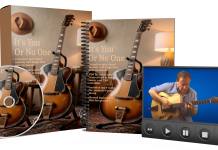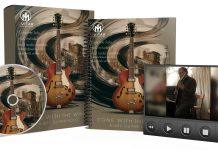This post may contain affiliate links. As an Amazon associate, Google associate as well as associate for other programs, Guitar & Music Institute may earn commissions from qualifying purchases.
Welcome to “Hints & Tips For Building Confidence As A Guitar Player,” where you’ll find practical strategies to help you regain your self-assurance if you find your lacking confidence. As a guitarist, it’s not uncommon for your confidence to waver due to various factors like personal issues, health challenges, or the dreaded imposter syndrome. This article is here to remind you of your progress, strengths, and the milestones you’ve already achieved. By reflecting on where you are now and appreciating how far you’ve come, you’ll discover that building confidence is entirely within your reach. Let’s dive into how you can harness these insights and elevate your guitar-playing prowess.
Hints & Tips For Building Confidence As A Guitar Player
Have you ever felt like your confidence as a guitar player isn’t where it should be? Maybe you’ve hit a rough patch in your musical journey, or perhaps you’ve been battling self-doubt for a while. Whatever the cause, know that you’re not alone. Many musicians experience fluctuations in their self-esteem for various reasons, be it personal circumstances, health issues, a dry spell of work, or the infamous imposter syndrome. In this friendly guide, we’ll delve into how you can build up your confidence by considering where you are as a player and, crucially, acknowledging all that you’ve achieved so far.

Understanding Your Current Playing Level
Before you can build confidence, it’s essential to understand where you stand as a guitar player. Taking stock of your current skills will help you identify areas for improvement and celebrate your strengths.
Assess Your Skills Objectively
Take some time to objectively evaluate your playing. Ask yourself:
- Technique: How proficient are you with basic and advanced techniques?
- Theory Knowledge: How well do you understand music theory?
- Versatility: Can you play different styles and genres?
- Performance: How comfortable do you feel playing in front of others?
Here’s a simple table to help you track your self-assessment:
| Skill Area | Rating (1-10) | Notes/Comments |
|---|---|---|
| Technique | ||
| Theory Knowledge | ||
| Versatility | ||
| Performance |
Set Realistic Goals
Based on your self-assessment, set realistic, achievable goals. These goals should be specific, measurable, achievable, relevant, and time-bound (SMART). For instance:
- Short-Term Goal: Learn and master a new chord progression within a week.
- Long-Term Goal: Perform a solo piece at an open mic night within six months.
Acknowledge Past Achievements
Sometimes we are too focused on what we need to improve and forget to acknowledge how far we’ve come. Reflecting on your past achievements can significantly boost your self-esteem.
Create a Musical Timeline
Document your guitar journey. Start from your very first lesson and jot down all the milestones you’ve achieved along the way. This could include:
- First Song Learned: The very first song you managed to play from start to finish.
- First Performance: Your debut performance, whether in front of friends or at a gig.
- New Techniques: The times when you mastered new techniques like fingerpicking, tapping, or alternate tunings.
Here’s an example layout for your musical timeline:
| Year | Milestone | Notes/Comments |
|---|---|---|
| 2015 | First Guitar Lesson | Struggled with the basics, but persevered. |
| 2015 | Learned “Wonderwall” by Oasis | Felt accomplished, gained confidence. |
| 2017 | First live performance at a local bar | Nerve-wracking, but a huge confidence booster. |
| 2018 | Mastered fingerpicking technique | Opened up new possibilities in playing style. |
Celebrate Small Wins
Don’t wait for huge milestones to celebrate. Acknowledge and celebrate the smaller victories that contribute to your overall progress. Each small win is a step towards building up your confidence.
Overcome Imposter Syndrome
Imposter syndrome is a common issue among musicians, where you feel like a fraud despite your accomplishments. This feeling can seriously hinder your confidence.
Recognize the Signs
Identifying signs of imposter syndrome is the first step to overcoming it. Do you often downplay your achievements? Do you feel like you don’t deserve your successes? Recognizing these thoughts is crucial.
Counter Negative Thoughts
Create a list of counterarguments to challenge your imposter thoughts. For instance:
- Imposter Thought: “I’m not as good as other guitarists.”
- Counterargument: “I have my own unique style and strengths. My journey and progress are valid.”
Talk About It
Don’t keep your feelings bottled up. Talk to fellow musicians, friends, or a mentor. Often, you’ll find that others have felt the same way and can offer advice and support.
Practice, Practice, Practice
Consistent practice is key to improvement and confidence. However, how you practice can make a significant difference.
Develop a Practice Routine
Structure your practice sessions to cover different aspects of playing, such as:
- Warm-Up: Spend 10-15 minutes on finger exercises and stretches.
- Technique: Dedicate 20-30 minutes to scales, arpeggios, and specific techniques.
- Songs: Practice pieces you are currently working on.
- Improvisation: Spend some time experimenting and improvising.
Here’s a sample practice routine for a 1-hour session:
| Time | Focus Area | Activity |
|---|---|---|
| 10 minutes | Warm-Up | Finger exercises, stretches |
| 20 minutes | Technique | Scales, arpeggios, specific techniques |
| 20 minutes | Songs | Practice current pieces |
| 10 minutes | Improvisation | Experiment with new ideas |
Focus on Weak Spots
Identify areas where you struggle and dedicate extra time to improving them. Overcoming these challenges will significantly boost your confidence.
Use Technology
Take advantage of technology to aid your practice. Apps and software can provide backing tracks, metronomes, and tutorials, making your practice sessions more effective and enjoyable.

Expand Your Musical Knowledge
Expanding your knowledge both theoretically and practically can boost your confidence as a guitarist.
Learn Music Theory
Understanding the theory behind what you’re playing can give you more control and insight into your music. Start with basics like scales, chords, and harmony, and gradually delve into more advanced topics.
Explore Different Genres
Don’t limit yourself to one style. Experimenting with different genres can make you a more versatile and confident player.
Attend Workshops and Masterclasses
These can be invaluable for learning new techniques, styles, and receiving feedback from experienced musicians. Plus, they often provide great networking opportunities.
Performance Skills
Confidence in your skills is one thing, but playing in front of others is a different ball game. Developing performance skills is crucial for your overall confidence as a guitarist.
Start Small
Begin by playing in front of family and friends. These small, informal performances will help build your confidence before moving on to larger audiences.
Record Yourself
Recording your practice sessions and performances can help you objectively analyze your playing. It also allows you to track your progress over time.
Join a Band or Group
Playing with others can boost your confidence and improve your timing, rhythm, and overall musicianship. It’s also a lot of fun!
Perform Regularly
The more you perform, the more comfortable you’ll become. Look for open mic nights, community events, or even casual jam sessions to gain performance experience.
Seek Feedback
Constructive feedback can be incredibly helpful for improving your playing and boosting your confidence.
Find a Mentor or Teacher
A good guitar teacher or mentor can provide personalized advice, help you overcome obstacles, and guide your progress.
Ask for Peer Feedback
Sometimes, feedback from fellow musicians can offer different perspectives and insights. Don’t be afraid to ask for their opinions and suggestions.
Be Open to Criticism
Constructive criticism is key to growth. Instead of taking it personally, use it as a tool to improve and refine your skills.
Maintain a Positive Mindset
Your mindset can significantly affect your confidence and progress as a guitar player.
Practice Self-Compassion
Be kind to yourself. Understand that everyone makes mistakes and has off days. Instead of being overly critical, acknowledge your efforts and progress.
Visualize Success
Visualization can be a powerful tool. Imagine yourself playing confidently and successfully, whether it’s nailing a difficult piece or performing on stage.
Surround Yourself with Positive Influences
Surround yourself with supportive people who encourage and motivate you. Avoid negative influences that bring you down or hinder your progress.
Keep a Progress Journal
Document your practices, achievements, and areas of improvement. This will help you see your progress objectively and keep you motivated.
Persevere Through Setbacks
Setbacks are inevitable in any learning journey. How you deal with them can impact your confidence and growth.
View Setbacks as Learning Opportunities
Instead of seeing setbacks as failures, view them as opportunities to learn and grow. Ask yourself what went wrong and how you can improve next time.
Stay Persistent
Perseverance is key to overcoming challenges. Keep practicing, learning, and staying motivated, even when things get tough.
Take Breaks
Sometimes, taking a short break can help you come back with a fresh perspective and renewed energy. Don’t be afraid to step away for a bit if you’re feeling overwhelmed.
Practical Examples from Famous Guitarists
Learning from the journeys of successful guitarists can provide valuable insights and inspiration.
Jimi Hendrix
Jimi Hendrix, one of the greatest guitarists of all time, faced numerous challenges throughout his career. Despite these, his dedication to practice and experimentation led to his unique, groundbreaking style.
Eric Clapton
Eric Clapton struggled with addiction and personal issues, yet his resilience and passion for music saw him through. His story reminds us that setbacks can be overcome with persistence and love for the craft.
John Mayer
John Mayer emphasizes the importance of practice and constantly pushing oneself out of comfort zones. His journey illustrates how continuous learning and growth contribute to confidence and success.
Final Thoughts
Building confidence as a guitar player is a journey, not a destination. It involves understanding your current skills, acknowledging past achievements, overcoming self-doubt, practicing diligently, expanding your knowledge, developing performance skills, seeking feedback, maintaining a positive mindset, and persevering through setbacks.
Remember, you’ve embarked on a wonderful musical journey, and every step, no matter how small, is progress. Celebrate your achievements, continue learning, and most importantly, enjoy the music. Your confidence will blossom as you grow, experiment, and stay committed to your love for the guitar.
So, pick up that guitar and start strumming away with renewed confidence. You’ve got this!
This post may contain affiliate links. As an Amazon associate, Google associate as well as associate for other programs, Guitar & Music Institute may earn commissions from qualifying purchases.
























![5 Best Guitar Display Cases [2024 Reviews] lbow](https://www.guitarandmusicinstitute.com/wp-content/uploads/2024/03/lbow-100x70.jpg)

